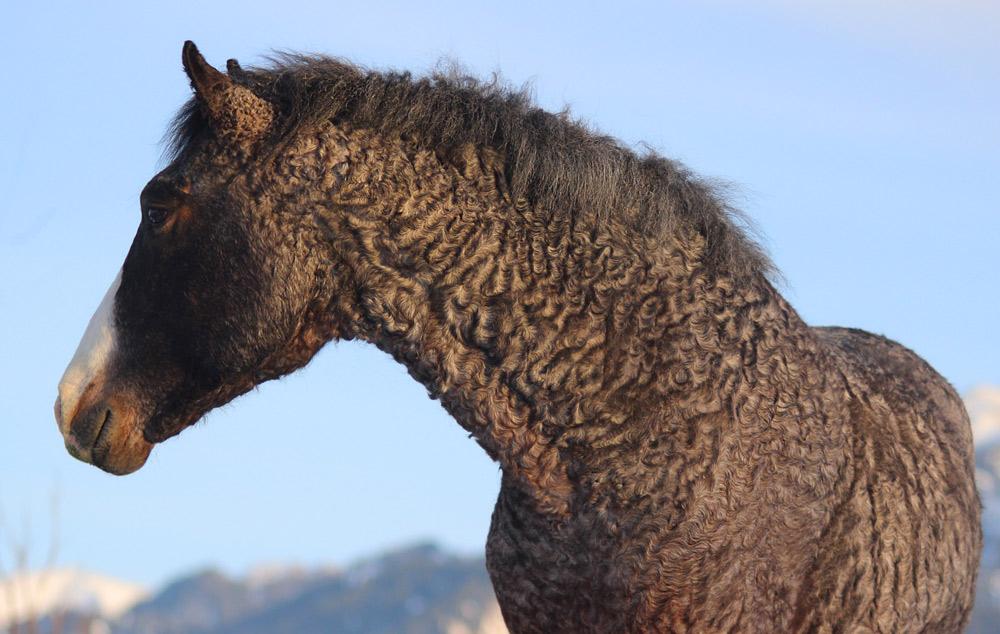Equine Curly Coat (CU1 / CU2)
Gene or Region: KRT25 and SP6
Reference Variant: G, C
Mutant Variant: A, T
Affected Breeds: Bashkir Curly, American Curly Horse, Mustang, Missouri Fox Trotter
Research Confidence: High - Strong association in studied population
Explanation of Results: KRT25/KRT25 = homozygous for Curly Coat, curly coat & complete/persistent hypotrichosis KRT25/n = heterozygous for Curly Coat, curly coat & incomplete hypotrichosis n/n = no variant detected SP6/SP6 = homozygous for Curly Coat, trait expressed SP6/n = heterozygous for Curly Coat, trait expressed n/n = no variant detected
General Description for Equine Curly Coat
Described in horses as early as the 1800’s, the curly coat phenotype can be observed in a wide range of “curliness” phenotypes, ranging from wavy to extreme permanent curled hairs. This variation in phenotype can also be seasonal, as some individuals shed their mane and tail during summer. Genetically, the curly coat is associated with two variants in the keratin 25 (KRT25) and transcription factor Sp6 (SP6) genes.
Some curly coat horses develop persistent or complete hypotrichosis, a form of follicular dysplasia, an effect associated with homozygosity of the dominant A allele in the keratin 25 (KRT25) gene. Heterozygotes (G/A) at the KRT25 gene may have incomplete hypotrichosis and curly coat. Meanwhile, the SP6 T allele is associated with a dominant curly phenotype, without hypotrichosis. The curly variant at KRT25 is epistatic over the SP6 variant, causing the individual to demonstrate hypotrichosis characteristics.
Interestingly, the curly coat is suggested as hypoallergenic and curly coat horses may be a suitable alternative for horse allergic riders. The curly coat trait has also been observed in dogs, cats, mice/rats, cattle, rabbits, pigs and humans!
Learn More about Equine Curly Coat on our podcast.
References
Morgenthaler, C., Diribarne, M., Capitan, A., Legendre, R., Saintilan, R., Gilles, M., Esquerré, D., Juras, R., Khanshour, A., Schibler, L., & Cothran, G. (2017). A missense variant in the coil1A domain of the keratin 25 gene is associated with the dominant curly hair coat trait (Crd) in horse. Genetics, selection, evolution : GSE, 49(1), 85. https://doi.org/10.1186/s12711-017-0359-5
Thomer, A., Gottschalk, M., Christmann, A., Naccache, F., Jung, K., Hewicker-Trautwein, M., Distl, O., & Metzger, J. (2018). An epistatic effect of KRT25 on SP6 is involved in curly coat in horses. Scientific reports, 8(1), 6374. https://doi.org/10.1038/s41598-018-24865-3
Mitlehner, W., Mitlehner, H. C., & Niggemann, B. (2015). Horse Allergy: Curly Horses Allow Horse Allergic Riders To Ride Again. Pferdeallergie: Curly Horses erlauben es pferdeallergischen Reitern wieder zu reiten. Pneumologie (Stuttgart, Germany), 69(12), 711–718. https://doi.org/10.1055/s-0034-1393396
More Horse Color Genetics
Congenital Stationary Night Blindness & Leopard Complex
Congential Stationary Night Blindness (CSNB) is characterized by the inability to see well in low light and no-light situations. It is linked to Leopard Complex Spotting (LP), where homozygous horses (LP/LP) will have CSNB. Congential Stationary Night Blindness is present at birth and is non-progressive.
Champagne
Champagne (CH) is a dilution that affects all coat colors. Champagne foals are born with pink skin and blue eyes that slightly darken with age. Adult champagne horses have a distinct pumpkin colored skin with mottling in the hairless regions, as well as amber/green/tan eyes. Horses with multiple dilutions can be difficult to accurately identify color without genetic testing.
